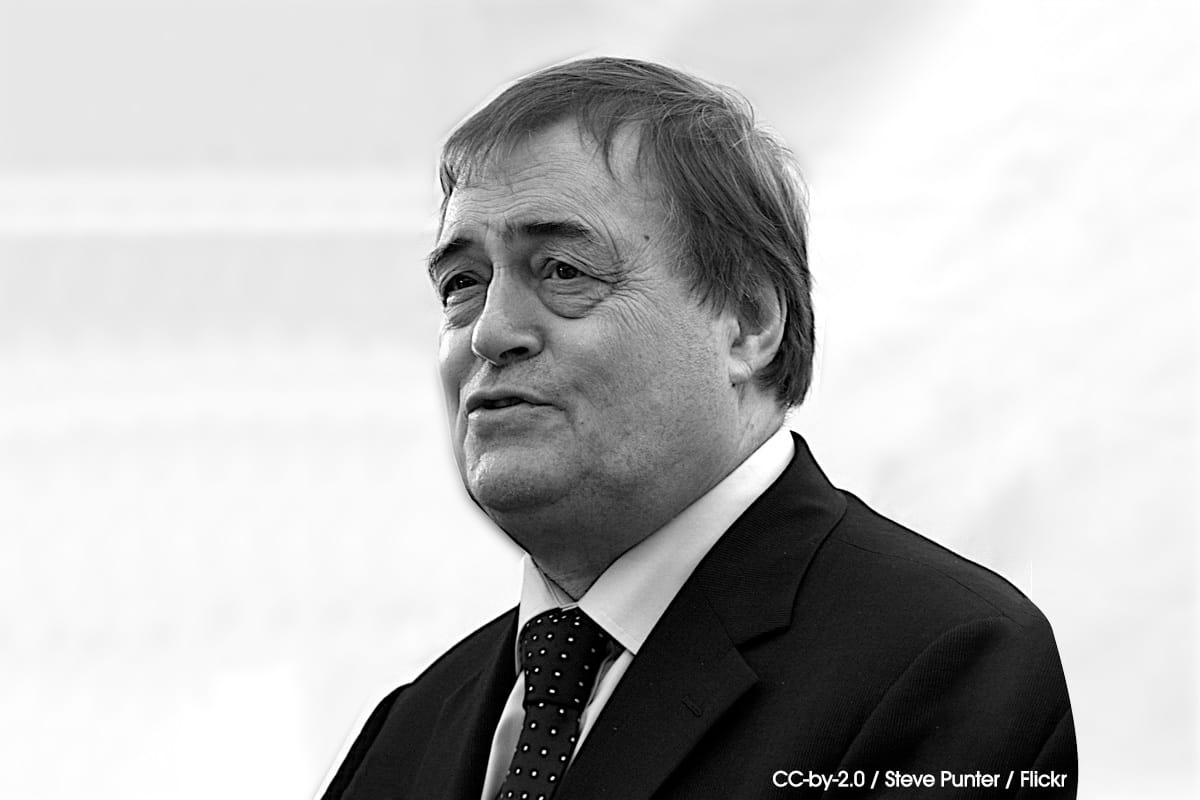This morning it was announced that John Prescott, the former Labour deputy prime minister under Tony Blair, has passed away.
Prescott came from a deeply working-class background in Wales, and was – prior to his political career – a firebrand union official for the National Union of Seamen (NUS).
But he went on to betray the class he came from, acting as a ‘left’ cover for Blair’s New Labour. And for his services, he was duly rewarded by the establishment with a place in the House of Lords.
From striker to strike-breaker
Prescott was born in the aftermath of the Great Depression, before the outbreak of WW2. He grew up in Brinsworth, Rotherham, and subsequently Upton-by-Chester.
After leaving school, he became a waiter in the Merchant Navy, as well as a popular shop steward for the NUS. He later rose to become a prominent full-time official within the union.
He took an active role in the 1966 seamen strike, which saw the Labour government enact emergency laws to quell action by the country’s seafarers.
Defending this decision, Prime Minister Harold Wilson stated that “the government must protect the vital interests of the nation”.
Prescott responded on behalf of the seamen: “From the beginning our strike, though essentially industrial, has been overshadowed by political implications and attacks.”
Little did Prescott know at the time, however, that he himself would go on to play the same role decades later.
“Take the gun away from my head,” he intoned as deputy PM in November 2002, in a patronising appeal to the firefighters’ union, as the government faced the prospect of industrial action. “That’s not the way to negotiate.”
New Labour counter-revolution
 Prescott’s role in the NUS led him to Parliament, when, in 1970, he was elected as MP for Hull East.
Prescott’s role in the NUS led him to Parliament, when, in 1970, he was elected as MP for Hull East.
In their obituary to John Prescott, the BBC, an ever-reliable mouthpiece for the British establishment, said that his “solid working-class credentials added powerful support to Tony Blair and the Labour modernisers.”
Indeed, Prescott’s primary role in the New Labour project was to provide a left cover for Blair’s counter-revolution.
Continuing Neil Kinnock’s witch-hunt against the Labour left, in the 1990s, Blair and co. sought to expunge any traces of democracy from the party.
This included attempts to reduce the influence of the trade unions over the Labour Party. And Prescott was instrumental in such efforts.
In 1995, he supported the removal of clause IV – the party’s commitment to common ownership – from the Labour constitution. This symbolic moment sent a clear message to the British capitalist class: New Labour is open for (big) business.
“When I do die, after 50 years in politics, all they will show on the news is 60 seconds of me thumping a fellow in Wales.”
RIP John Prescott pic.twitter.com/1k6yMNc6F4
— PoliticsJOE (@PoliticsJOE_UK) November 21, 2024
Blairite stooge
In 1997, after years of Tory chaos and decline, New Labour swept to power.
In government, Prescott backed the Afghanistan war, the Iraq war, Private Finance Initiatives, tuition fee increases, marketisation, and the academisation of schools.
Furthermore, the New Labour leaders refused to reverse any of Thatcher’s privatisations or repeal her government’s anti-trade union laws.
One of Prescott’s main roles was to manage relations with workers’ leaders on behalf of the government (and, in turn, the capitalists); to act as a negotiator – a Blairite stooge – when confrontations arose.
He was consistently sent in to diffuse tensions with the trade unions, deploying his union background and working-class credentials to gain authority.
In 2004-5, for example, in the midst of a dispute between the government and civil servants, he stressed the need for below-inflation pay increases, job cuts, and a higher retirement age.
In return, in 2010, he was awarded a life peerage and ennobled as Baron Prescott of Kingston Upon Hull.
Red herring
Much has been made of John Prescott’s personal qualities.
His rough-hewn charisma and sharp tongue made him a relatable figure to those fighting on the shopfloor. As a politician, meanwhile, he was unconventional and ‘authentic’. He called himself ‘Old Labour’, and did not appear like someone from the upper echelons of society (until he became a gown-clad Lord, that is).
To have him promote the New Labour brand, in this respect, was not only useful for the Blairites and their paymasters; it was a conscious and necessary policy to deceive the British working class.
As Tony Blair himself stated this morning on BBC Radio 4, Prescott “could reach parts of the electorate I could never reach”. Here we have it straight from the horse’s mouth!
“I’m feeling devastated. There was no one quite like him in British politics.”
Former Prime Minister Sir Tony Blair says John Prescott reached parts of the Labour Party he couldn’t reach. #R4Today
— BBC Radio 4 Today (@BBCr4today) November 21, 2024
There is no shortage of political figures today who fit the Prescott mould.
Take Angela Rayner, for example: a northern, working-class single mother who never went to university; who rose through the ranks of the trade unions; and who now fulfils the same function in Starmer’s Labour government as Prescott did in Blair’s.
Unfortunately, there are still those on the left who sow illusions in such characters, placing their trust in these wolves in sheep’s clothing.
I am deeply saddened by the news of John Prescott’s death.
John was not only a Labour legend but an inspiration to me and a dear friend. He will be greatly missed by so many.
My thoughts and prayers are with Pauline and the rest of his family. May he rest in peace. pic.twitter.com/QL43Ip2fXN
— Angela Rayner (@AngelaRayner) November 21, 2024
Legacy and lessons
Prescott may be fondly remembered for his charming ‘salt of the earth’ personality, and his ability to connect with working-class people.
But behind this veneer stood a shrewd operator, who willingly carried out the diktats of big business at the head of successive Blairite governments.
Some on the left have given Prescott credit for being one of the few New Labour figures to have vocally offered support to Jeremy Corbyn during his time as leader.
I am really sad to hear that John Prescott has passed away.
John was a huge figure and personality, from his seafaring union days to the highest offices in Government.
I will be forever grateful for his personal and political support in the 2017 and 2019 elections. His…
— Jeremy Corbyn (@jeremycorbyn) November 21, 2024
But such platitudes are misplaced. Talk is cheap, the saying goes. You should judge a man not by his words, but by the company he keeps.
And figures like Prescott and Rayner have closely associated with some rather sordid, unscrupulous characters in their efforts to rise up the greasy pole.
Beware of false friends. This is the lesson that communists should take from the life of Mr Prescott.






